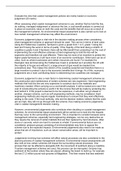Essay
Evaluate the view that coastal management policies are mainly based on economic judgement (20 marks)
- Module
- Coastal landscapes
- Institution
- PEARSON (PEARSON)
This essays answers the question that is the title. This answers was written by an A - Level Geography student who finished the course with an A*
[Show more]



